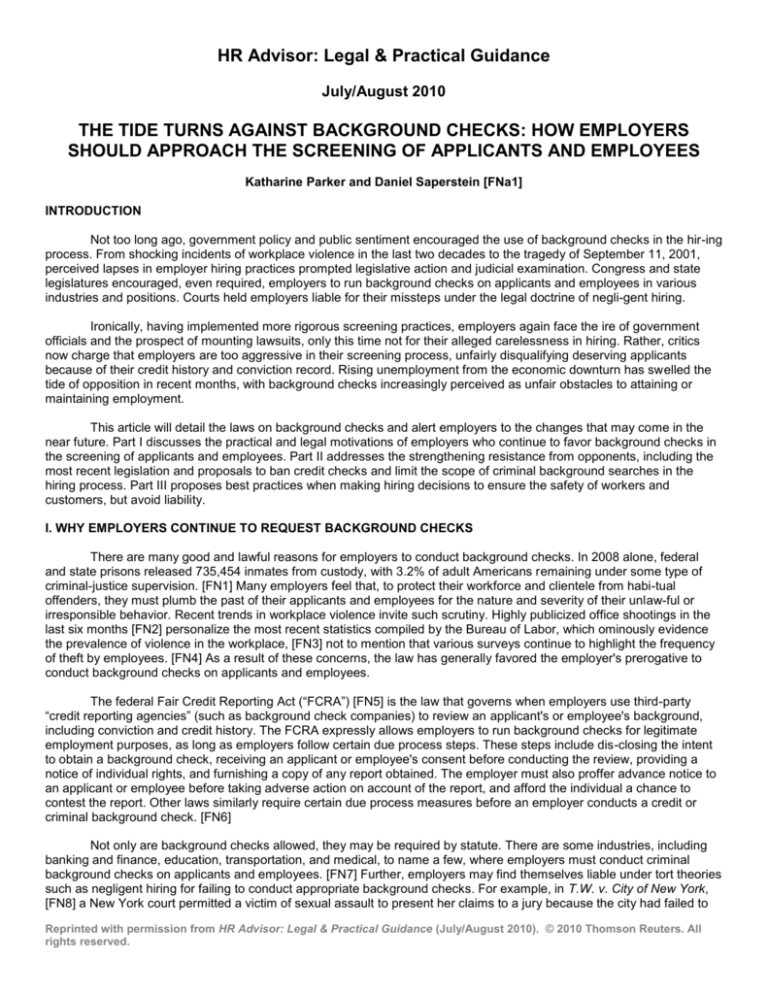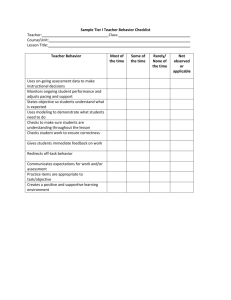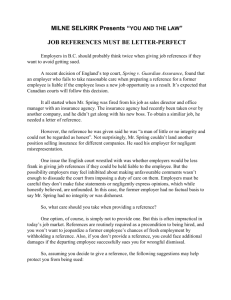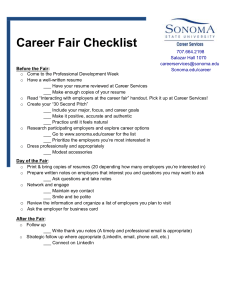
HR Advisor: Legal & Practical Guidance
July/August 2010
THE TIDE TURNS AGAINST BACKGROUND CHECKS: HOW EMPLOYERS
SHOULD APPROACH THE SCREENING OF APPLICANTS AND EMPLOYEES
Katharine Parker and Daniel Saperstein [FNa1]
INTRODUCTION
Not too long ago, government policy and public sentiment encouraged the use of background checks in the hir-ing
process. From shocking incidents of workplace violence in the last two decades to the tragedy of September 11, 2001,
perceived lapses in employer hiring practices prompted legislative action and judicial examination. Congress and state
legislatures encouraged, even required, employers to run background checks on applicants and employees in various
industries and positions. Courts held employers liable for their missteps under the legal doctrine of negli-gent hiring.
Ironically, having implemented more rigorous screening practices, employers again face the ire of government
officials and the prospect of mounting lawsuits, only this time not for their alleged carelessness in hiring. Rather, critics
now charge that employers are too aggressive in their screening process, unfairly disqualifying deserving applicants
because of their credit history and conviction record. Rising unemployment from the economic downturn has swelled the
tide of opposition in recent months, with background checks increasingly perceived as unfair obstacles to attaining or
maintaining employment.
This article will detail the laws on background checks and alert employers to the changes that may come in the
near future. Part I discusses the practical and legal motivations of employers who continue to favor background checks in
the screening of applicants and employees. Part II addresses the strengthening resistance from opponents, including the
most recent legislation and proposals to ban credit checks and limit the scope of criminal background searches in the
hiring process. Part III proposes best practices when making hiring decisions to ensure the safety of workers and
customers, but avoid liability.
I. WHY EMPLOYERS CONTINUE TO REQUEST BACKGROUND CHECKS
There are many good and lawful reasons for employers to conduct background checks. In 2008 alone, federal
and state prisons released 735,454 inmates from custody, with 3.2% of adult Americans remaining under some type of
criminal-justice supervision. [FN1] Many employers feel that, to protect their workforce and clientele from habi-tual
offenders, they must plumb the past of their applicants and employees for the nature and severity of their unlaw-ful or
irresponsible behavior. Recent trends in workplace violence invite such scrutiny. Highly publicized office shootings in the
last six months [FN2] personalize the most recent statistics compiled by the Bureau of Labor, which ominously evidence
the prevalence of violence in the workplace, [FN3] not to mention that various surveys continue to highlight the frequency
of theft by employees. [FN4] As a result of these concerns, the law has generally favored the employer's prerogative to
conduct background checks on applicants and employees.
The federal Fair Credit Reporting Act (“FCRA”) [FN5] is the law that governs when employers use third-party
“credit reporting agencies” (such as background check companies) to review an applicant's or employee's background,
including conviction and credit history. The FCRA expressly allows employers to run background checks for legitimate
employment purposes, as long as employers follow certain due process steps. These steps include dis-closing the intent
to obtain a background check, receiving an applicant or employee's consent before conducting the review, providing a
notice of individual rights, and furnishing a copy of any report obtained. The employer must also proffer advance notice to
an applicant or employee before taking adverse action on account of the report, and afford the individual a chance to
contest the report. Other laws similarly require certain due process measures before an employer conducts a credit or
criminal background check. [FN6]
Not only are background checks allowed, they may be required by statute. There are some industries, including
banking and finance, education, transportation, and medical, to name a few, where employers must conduct criminal
background checks on applicants and employees. [FN7] Further, employers may find themselves liable under tort theories
such as negligent hiring for failing to conduct appropriate background checks. For example, in T.W. v. City of New York,
[FN8] a New York court permitted a victim of sexual assault to present her claims to a jury because the city had failed to
Reprinted with permission from HR Advisor: Legal & Practical Guidance (July/August 2010). © 2010 Thomson Reuters. All
rights reserved.
conduct an appropriate background check when hiring the perpetrator that would have revealed past sex offense
convictions. While in Cromp v. Greyhound Lines, Inc., [FN9] even though the employer conducted a background check for
the years 1987-1997 on a bus driver who sexually assaulted a passenger, the court found that the employee's 1980
conviction for sexual assault raised an issue for the jury as to whether the employer was negli-gent in hiring. With the
availability of background information on the internet, proliferation of background screening companies, and the low cost
of conducting screening relative to the risks of not conducting them, courts appreciate the ease with which employers can
perform a background check and have taken employers to task for not exercising appropriate care in hiring.
II. THE BACKLASH AGAINST BACKGROUND CHECKS
The Voice of the Opposition
Notwithstanding all the compelling reasons, legal and business, that employers conduct background checks,
there is a growing resistance to the practice. Some critics, such as the U.S. Equal Employment Opportunity Com-mission
(“EEOC”), have argued that credit and criminal background checks in hiring violate discrimination laws, maintaining that
such inquiries “should be avoided because they tend to impact more adversely on minorities and females.” [FN10] For
instance, in EEOC v. Dolgencorp., [FN11] the EEOC asked the court to approve its request for statistics to show that
blacks were more frequently terminated than whites as a result of criminal background checks. Similarly, in E.E.O.C. v.
Von Maur, Inc., [FN12] the EEOC alleged that the employer used credit checks as a pretext to discriminate against
African American applicants. Private plaintiffs' attorneys also have initiated suits against employers on this basis. In
Jackson v. Southeastern Pa. Transp. Auth., [FN13] the plaintiff contended that the screening practices of the employer on
applicants for drivers had a disparate impact on African Americans. Likewise, in Ganzy v. Sun Chem. Corp., [FN14] the
plaintiff argued that the employer's use of arrest and conviction records had an adverse impact on African Americans.
While in Crawford v. Dep't of Homeland Security, [FN15] a suit against the federal government, the plaintiff alleged that
the use of background checks on applicants had a dis-parate effect on African Americans.
Some critics also cite public policy concerns in challenges to employer screening. Victims of corporate economizing, the housing bust, and runaway medical bills allege that they cannot find work due to their poor credit histo-ry.
[FN16] While some critics find it unfair that individuals who have filed for bankruptcy enjoy more protection under the law
[FN17] than individuals who may have a bad credit score but who have managed to avoid bankruptcy. Opponents also
highlight studies that exhibit the discouraging nexus between unemployment and recidivism. [FN18] Indeed, advocacy
groups believe that ex-offenders not only have served their time, but also need gainful employ-ment to avoid returning to
crime. [FN19]
Finally, some critics allege that background checks compromise an applicant's or employee's privacy rights,
something that the U.S. Court of Appeals for the Ninth Circuit recently addressed in Nelson v. National Aeronautics and
Space Admin. [FN20] The plaintiffs, a group of contract workers at NASA's Jet Propulsion Laboratory, operated by the
California Institute of Technology under a contract with the federal government, claimed that the NASA-mandated
background checks violated their constitutional right to informational privacy. The background checks queried the
applicant's criminal history, financial integrity, drug use and treatment, and other personal matters. The court issued a
preliminary injunction against NASA, questioning the lawfulness of the background checks and whether they were
narrowly tailored to meet the government's legitimate interests. [FN21] NASA has filed a petition for certiorari with the U.S.
Supreme Court, which was granted on March 8, 2010. Oral argument is scheduled for the October 2010 term.
The Response of Public Officials
The public's outcry has prompted legislatures to reconsider the fairness of credit checks to working Americans
who have fallen behind on their bills through no fault of their own. At the federal level, there is proposed legislation to
amend the FCRA to prohibit employers from requesting or using a credit report, except if required by law, for national
security or for managerial and professional employees of financial institutions. [FN22] The bill has 53 sponsors and is
currently in committee. A number of states also have begun to restrict the use of credit checks in the employment context.
Hawaii and Washington have paved the way, recently enacting laws that limit the extent to which employers may consider
credit history.
Hawaii's law provides that “[i]nquiry into and consideration of a prospective employee's credit history or credit
report may take place only after the prospective employee has received a conditional offer of employment, which may be
withdrawn if information in the credit history or credit report is directly related to a bona fide occupational qualification.”
[FN23] Hawaii's law does not apply to “employers who are permitted or required to inquire into an individual's credit
history for employment purposes pursuant to any federal or state law,” “managerial or supervisory employees,” or
“financial institutions in which deposits are insured by a federal agency having jurisdiction over the financial institution.”
[FN24] Washington's law similarly provides that a “person may not procure a consumer report for employment purposes
where any information contained in the report bears on the consumer's creditworthiness, credit standing, or credit
Reprinted with permission from HR Advisor: Legal & Practical Guidance (July/August 2010). © 2010 Thomson Reuters. All
rights reserved.
capacity, unless the information is either: (i) [s]ubstantially job related and the employer's reasons for the use of such
information are disclosed to the consumer in writing; or (ii) [r]equired by law.” [FN25]
Similar bills have been proposed in at least 17 states, with language comparable to the Washington and Hawaii
laws. [FN26] For example, in Oregon, pending the signature of the governor, credit checks will be prohibited unless
employers are federally insured banks or credit unions, required by federal or state law, employing certain public officers,
or the check is “substantially job-related.” [FN27] In New York, proposed bills in the Assembly and the Senate, which
remain mired in committee, have labeled a credit report “an unlawful discriminatory practice” unless “directly related to the
occupational position.” [FN28] There have been setbacks for the opponents of credit checks, however. The governor of
California vetoed a proposed ban last year and a Senate panel in Maryland recently re-jected a similar bill. [FN29]
Many states also have limited the ability of employers to inquire into an applicant's or an employee's conviction
history. [FN30] Under New York law, for instance, to deny employment to individuals previously convicted of one or more
criminal offenses is “unfair discrimination,” unless there is a “direct relationship” between the criminal of-fense and the
specific employment sought, or the hiring or continuation of employment involves an “unreasonable risk to property or to
the safety or welfare of specific individuals or the general public.” [FN31] New York law re-quires employers to evaluate a
number of factors in determining whether a direct relationship or threat exists, includ-ing but not limited to “the specific
duties and responsibilities necessarily related to the license or employment sought or held by the person,” “the time which
has elapsed since the occurrence of the criminal offense or offenses,” “the age of the person at the time of occurrence of
the criminal offense or offenses,” and “the seriousness of the offense or offenses.” [FN32] Under New York law,
employers enjoy a rebuttable presumption to exclude a person's criminal record in cases of negligent hiring if they can
show that, even knowing the applicant's past criminal record, they evaluated the above-mentioned factors and “made a
reasonable, good faith determination that such factors militate in favor of hire or retention of that applicant or employee.”
[FN33] Similarly, under Massachusetts law, employers must allow applicants to check “no record” under certain
circumstances. [FN34] The law prohibits inquiries concerning misdemeanor convictions, and forbids employers from
requesting information about first convictions of certain misdemeanors or misdemeanor convictions more than five years
old. [FN35]
The EEOC has opposed barring individuals from employment simply on account of their conviction records,
labeling “such a policy or practice [a]s unlawful under Title VII in the absence of a justifying business necessity.” [FN36]
Federal courts also have addressed the issue. In the landmark case, Green v. Missouri Pacific Railroad Company, [FN37]
the U.S. Court of Appeals for the Eighth Circuit, in a post-remand appeal, held that employers may consider past criminal
convictions in hiring as long as they have weighed the nature and seriousness of the of-fense(s), the time which has since
elapsed from the conviction and/or completion of the sentence, and the nature of the job held or sought.
III. BEST PRACTICES FOR 2010
Given the swiftly changing legal currents, employers should consider the following course of action.
Review laws, regulations or contracts that may require background screening of applicants or employees and those state
laws that may restrict screening.
Review applicable credit reporting laws to ensure that they are providing the necessary disclosures and notices to and
obtaining consent from the individuals to be screened, and otherwise complying with any new applicable laws.
Determine the extent to which its screening process should be tailored so that it can be justified as job-related and
consistent with business necessity.
Assess whether the screening process has had a disparate impact on minorities or other protected groups, as well as
whether it has measurable value as a screening tool and predictor of good performance.
Update and tailor notices, forms and procedures based on this review and stay current on legal developments in this area.
Wait until after the offer of employment to request a background check.
Afford applicants and employees a forum to dispute the results of the background check and offer additional information.
[FN1]. Bureau of Justice Statistics, http://bjs.ojp.usdoj.gov/index.cfm? ty=tp&tid=131; Mindy Tarlow, Netter Con-ference
on Race, Criminal Records & Employment, Oct. 9, 2009.
Reprinted with permission from HR Advisor: Legal & Practical Guidance (July/August 2010). © 2010 Thomson Reuters. All
rights reserved.
[FN2]. See Two Dead in Ohio State Shooting, ASSOCIATED PRESS, Mar. 9, 2010; Sarah Wheaton & Shaila De-wan,
Professor Said to Be Charged After Three Are Killed in Alabama, N.Y. TIMES, Feb. 12, 2010, at A12; Robert McFadden,
Army Doctor Held in Fort Hood Rampage, N.Y. TIMES, Nov. 5, 2009, at A1.
[FN3]. See United States Department of Labor, Bureau of Labor Statistics, Injuries, Illnesses, and Fatalities Fre-quently
Asked Questions (FAQs),http:// www.bls.gov/iif/oshfaq1.htm; http://www.bls.gov/iif/oshwc/osh/os/osnr0032.txt.
[FN4]. See Kathy Grannis, Troubled Economy Increases Shoplifting Rates, According to National Retail Security Survey,
NATIONAL RETAIL FEDERATION, June 16, 2009, www.nrf.com/modules.php?name=News&op=viewlive&sp_id=746. 16
NO. 4 HR-ADV 2 Page 5 16 No. 4 HR Advisor: Legal & Practical Guidance 2 © 2010 Thomson Reuters. No Claim to Orig.
US Gov. Works.
[FN5]. 15 U.S.C.A. § 1681 et seq.
[FN6]. See, e.g., CAL. CIV. CODE §§ 1785.1 et seq., 1785.11(a)(3)(B), 1785.20.5(a)-1785.21(a); C.R.S. §§ 12-14.3-101,
et seq.; 10 M.R.S.A § 1313-A; N.J.S.A. 56:11-31; N.Y. GEN. BUS. L. §§ 380-a(c)(1), 380-b(b).
[FN7]. See, e.g., Federal Deposit Insurance Act, 12 U.S.C.A. § 1829; Securities Exchange Act, 15 U.S.C.A. § 78q(f);
National Child Protection Act, 42 U.S.C.A. § 5119a; 210 ILL. COMP. STAT. 55/6.3, 6.7, 225 ILL. COMP. STAT. 46/10 55; CAL. EDUC. CODE §§ 33192-93, 451215.1-2; VA. CODE ANN. § 37.2-416; N.J. STAT. ANN. §§ 18A:6-7.1c, 18A:3918-20, Pub. L. No. 107-295.
[FN8]. T.W. v. City of New York, 286 A.D.2d 243, 729 N.Y.S.2d 96 (1st Dep't 2001).
[FN9]. Cromp ex rel. Cromp v. Greyhound Lines, Inc., 2003 WL 23008977 (D.N.D. 2003).
[FN10]. EEOC, Pre-Employment Inquiries and Credit Rating or Economic Status,
http://www.eeoc.gov/laws/practices/inquiries_credit.cfm.
[FN11]. U.S. E.E.O.C. v. Dolgencorp., 2008 WL 4542973 (N.D. Ill. 2008).
[FN12]. E.E.O.C. v. Von Maur, Inc., 2007 WL 3503435 (S.D. Iowa 2007).
[FN13]. Jackson v. Southeastern Pennsylvania Transp. Authority, 260 F.R.D. 168 (E.D. Pa. 2009).
[FN14]. Ganzy v. Sun Chemical Corp., 2008 WL 3286262 (E.D. N.Y. 2008).
[FN15]. Crawford v. U.S. Dept. of Homeland Sec., 245 Fed. Appx. 369, 19 A.D. Cas. (BNA) 1333, 101 Fair Empl. Prac.
Cas. (BNA) 948 (5th Cir. 2007), cert. denied, 128 S. Ct. 2487, 171 L. Ed. 2d 768, 20 A.D. Cas. (BNA) 1088 (2008).
[FN16]. See, e.g., Jonathan Glater, Another Hurdle for the Jobless: Credit Inquiries, N.Y. TIMES,
Aug. 6, 2009, at A1.
[FN17]. See 11 U.S.C.A. § 525(b).
[FN18]. See Center for Employment Opportunities, The Facts: Unemployment and Recidivism,
http://www.ceoworks.org/images/CEObreaksincarcerationcycle_ nyc.pdf.
[FN19]. See Ex-Prisoners and Prisoners Organizing for Community Advancement, http://exprisoners.org.
[FN20]. Nelson v. National Aeronautics and Space Admin., 530 F.3d 865, 27 I.E.R. Cas. (BNA) 1397 (9th Cir. 2008), cert.
granted, 130 S. Ct. 1755, 176 L. Ed. 2d 211 (2010).
[FN21]. Nelson v. National Aeronautics and Space Admin., 530 F.3d 865, 27 I.E.R. Cas. (BNA) 1397 (9th Cir. 2008), cert.
granted, 130 S. Ct. 1755, 176 L. Ed. 2d 211 (2010).
[FN22]. HR 3149, 111th Congress. 16 NO. 4 HR-ADV 2 Page 6 16 No. 4 HR Advisor: Legal & Practical Guidance 2 ©
2010 Thomson Reuters. No Claim to Orig. US Gov. Works.
Reprinted with permission from HR Advisor: Legal & Practical Guidance (July/August 2010). © 2010 Thomson Reuters. All
rights reserved.
[FN23]. Haw. Rev. Stat. § 378-2.7.
[FN24]. Haw. Rev. Stat. § 378-2.7.
[FN25]. Wash. Rev. Code § 19.182.020.
[FN26]. See States May Ban Credit Checks on Job Applicants, ASSOCIATED PRESS, Mar. 1,
2010.
[FN27]. S. B. 1045, 75th Leg. Assem., 2010 Spec. Sess. (Or. 2010).
[FN28]. Assem. B. 2067, S. B. 2837, 231st Leg. Sess., Reg. Sess. (N.Y. 2009).
[FN29]. See States May Ban Credit Checks on Job Applicants, supra note 26; Lorraine Mirabella, Md. Senate Panel
Rejects Bill to Limit Employers' Use of Credit Checks, BALT. SUN, Mar. 26, 2010, http://articles.baltimoresun.com/201003-26/business/bal-bz.credit26mar26_1_credit-checks-senate-panel-rejects-bill-valuable-screening-tool.
[FN30]. See, e.g., N.Y. EXEC. LAW § 296(15) and N.Y. CORREC. LAW §§ 750-53; MASS. GEN. L.C. 276 § 100A, 151B
§ 4(9); WIS. STAT. § 111.335; MGO 39.08(8)(i)(3b).
[FN31]. N.Y. Correc. Law § 752.
[FN32]. N.Y. Correc. Law § 753.
[FN33]. N.Y. Exec. Law § 296(15).
[FN34]. Mass. Gen. L.C. 276 § 100A.
[FN35]. Mass. Gen. L.C. 151B § 4(9).
[FN36]. EEOC, Policy Statement on the Use of Statistics in Charges Involving the Exclusion of
Individuals with Conviction Records from Employment, July 29, 1987, http://www.eeoc.gov/policy/docs/convict2.html.
[FN37]. Green v. Missouri Pac. R. Co., 549 F.2d 1158, 14 Fair Empl. Prac. Cas. (BNA) 878, 13 Empl. Prac. Dec. (CCH) P
11579 (8th Cir. 1977).
[FNa1]. KATHARINE PARKER is a partner with Proskauer Rose LLP in New York and Co-Chair of its Employment
Law Counseling Practice Group. She can be reached at kparker@proskauer.com. DANIEL SAPERSTEIN is an associate in Proskauer's Labor & Employment Department in Newark, New Jersey. He can be reached at dsaperstein@proskauer.com. 16 No. 4 HR Advisor: Legal & Practical Guidance 2
Reprinted with permission from HR Advisor: Legal & Practical Guidance (July/August 2010). © 2010 Thomson Reuters. All
rights reserved.







